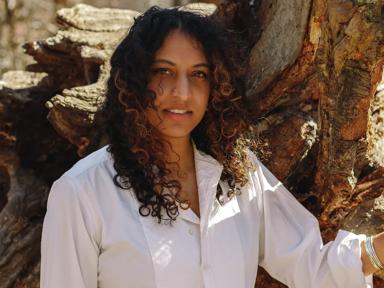Poet Arji Manuelpillai on inspiration, influences and Improvised Explosive Device

Arji Manuelpillai’s career path is much-varied one; at times he name has been prefixed with the words rapper, musician, performer, creative facilitator and now, here on this page, poet.
But there is a constant strand that connects all these junctions in Manuelpillai’s life; the opportunity to interact with people. Over 15 years working with community arts projects nationally and internationally Manuelpillai has met a lot of people, from very different walks of life, and the experiences of many of them were brought to life in the pages of his debut pamphlet, Mutton Rolls.
As a poet Manuelpillai has been shortlisted for a number of prizes including the BAME Burning Eye pamphlet prize, The Robert Graves Prize, The Oxford Prize, and The National Poetry Prize. A member of Wayne Holloway-Smith’s poetry group, Malika’s Poetry Kitchen and London Stanza, his poetry has appeared in magazines including Cannon’s Mouth, Strix, The Rialto and Bath Magg.
Published by Penned in the Margins, Manuelpillai's debut collection Improvised Explosive Device hits the shelves later this month. A reflection of hate crime and radicalisation in the UK, the collection – as the poet himself explains later in this piece – evolved from the Out-Spoken published Mutton Rolls.
On Thursday 20 October, Manuelpillai joins us at our London Literature Festival as part of a special event celebrating debut writers from the city. Unable to wait until then to get to know him a little better, we caught up with the poet to find out about the inspiration and creative processes behind his collection and just how emotional an experience it can be to send your creative work out into the world.
So, what gave you the inspiration for this, your debut collection?
A few years ago I wrote a pamphlet called Mutton Rolls. It drew on my lived experience as a British Sri Lankan. It spoke about racism but I felt like the voice, though entertaining, lacked any real hard hit. I didn’t want to be a comedy act, I didn’t want to be led by the masses and fulfil the stereotype of being another Asian talking about being Asian. I wanted to do something different. I wanted to create a collection that was wholly original. Throughout my life I’ve been fascinated by people. As a facilitator working with marginalised communities I’ve had the privilege of speaking with people from all walks of life. I feel like it is my gift in life. So I set out to bring my love for poems and people together into one collection.
I was already writing poems about violence and the reasons violence might occur in a society. I guess the drive came from a family holiday, when my Auntie spoke to me about the Tamil Tigers and the effect it had had on my family’s life. She explained how she was pushed into hiding by rioters and during that time she had considered what it would be like to become a suicide bomber for the Tigers. This idea fascinated me. I was fascinated by how far we all are from an act of terror.
After funding from the Arts Council I began to speak to an array of extremists, radicals and those affected by extreme violence. I spoke to so many interesting people and I began to use the conversations to springboard into poems. These people inspired me because their stories were truly unheard. They had spent their lives not being listened to and many were liberated by my gentle ear. I didn’t interrupt nor give my opinion, I just took the information on board and attempted to capture it in the poems later. This approach fuelled me and the more I spoke to people the more I was inspired to write. This is pretty much how the collection came together, with a lot of help from a feedback group and my mentor Hannah Lowe.
How does it feel to be sending something you’ve put so much time and creative endeavour into, out into the wider world?
It’s scary as hell. I couldn’t have anticipated what a rollercoaster the last couple months have been. Lots of highs, but lots of lows too, and the void is huge. So much self-doubt not just in terms of this project but also when I think of creating a new thing. I try to keep my approach playful and light hearted, try to keep my head out of the reviews and reactions and just accept it for what it is. It’s a book, I spent a long time on it, and now it’s done… and that’s pretty miraculous.
‘I try to keep my head out of the reviews and reactions and just accept it for what it is. It’s a book, I spent a long time on it, and now it’s done… and that’s pretty miraculous.’
With Improvised Explosive Device being your first collection, did you have an audience in mind when writing it, or were you writing more for yourself?
I wanted to create a text that didn’t take sides. That laid the issues from the UK naked for the reader. I wanted the reader to make their own decision. So I guess in that respect I was thinking of the reader. This book was never about ridiculing or embarrassing people with views different to mine. Far from it, I wanted to pay homage to the human condition and focus on the similarities rather than our differences. I want to make it clear, I write for an audience because I want to make a change. It’s important to me and any way I can do that I will try to do it.
Who are your great literary, and non-literary influences?
Although I’ve read some poets considered classic to British literature I can’t say I would read them for fun. I’m into the contemporary stuff. I treat poetry like a DJ treats his records. I like the new new stuff, the sort of poems that make you think. The sort of weird poems that slap you round the face and shake the hell out of you. My biggest influences are probably Terrence Hayes, Rebecca Tamas, and Shane McRae. But there are loads I love. I’m also a fan of the next generation coming up, poets like Katie O Pray, Maia Elsner, Jessica Murrain and Alycia Pirmohamed.
Outside of poetry I love artists who break across genres, I love science and learning more about how the world works and I love discovering the intricacies of the human mind in order to better understand human beings and their actions.
‘I wanted to create a text that didn’t take sides. That laid the issues from the UK naked for the reader.’
Did you always want to be a poet? And if you weren’t a poet, what do you think you would be instead?
I always liked writing poems. I only started taking it seriously about seven years ago. I started seeking feedback, reading more and generally pushing myself towards this goal. But I have been a lot of things in my career. I’ve rapped for an international touring band called Oojami; I had my own band called The Leano. I toured with a children’s theatre company called A Line Art and I’ve worked outdoors on some wholly ridiculous shows. I’ve also been teaching workshops in multidisciplinary arts for over 15 years.
I love poems but my dream has always been to make creativity my career. I’m so pleased to have achieved that... for now. I think if I weren’t a poet right now, I’d like to be working with people, whether that’s care work, teaching or even running a greasy spoon. I find conversations lift my spirit and fuel me in life. I’m so blessed to be able to meet great people every day.
A lot of people might feel unsure of how to access contemporary poetry, do you have any suggestions to people looking to discover more?
It’s true that this scene is pretty tightly knit, meaning English teachers don’t often know who the poets coming up are. Bookshops don’t often stick the great, great stuff on their shelves, so where do we go to discover work? Firstly, seek out the independent bookshops in your area. Look at publishers like Bad Betty, Out-Spoken, Nine Arches and Penned in the Margins. Look at magazines like Poetry Review, Modern Poetry Translation and The Rialto. Also podcasts do a great job for lifting the scene. Look at my podcast called Arji’s Poetry Pickle Jar. Check out Poetry Society Podcast, Faber podcast and Poetry Unbound. And finally, go on Twitter. For me, Twitter is the home of the poet. Block the trolls, loop out the marketing ads and focus on writers and poets.

Arji Manuelpillai joins James Cahill, Gurnaik Johal and Sheena Patel at our London Literature Festival on Thursday 20 October for a discussion about new work that celebrates the city.